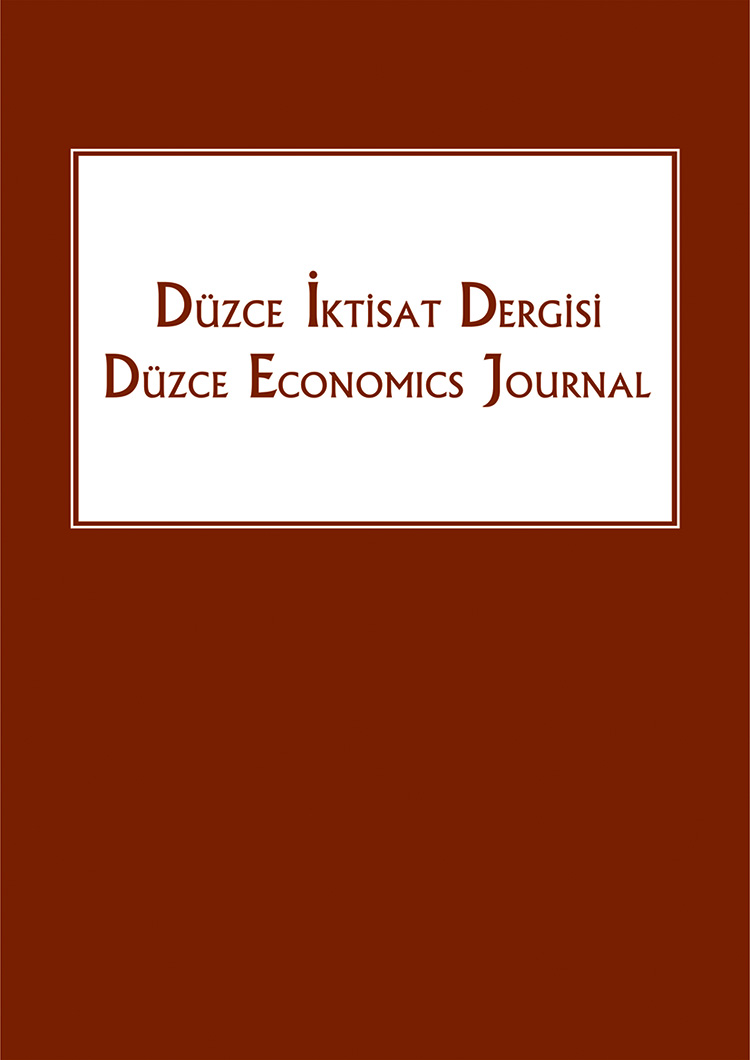Araştırma Makalesi | Açık Erişim
Düzce İktisat Dergisi 2021, Clt. 2(1) 63-79
Türkiye İçin Cari İşlemler Dengesi Beklentilerinin Rasyonalitesi Üzerine Ekonometrik Bir Analiz
ss. 63 - 79
Yayın Tarihi: Nisan 28, 2021 | Görüntüleme Sayısı: 79/569 | İndirilme Sayısı: 99/1.428
Özet
Rasyonel beklentiler hipotezine göre ekonomik karar birimleri bir değişkenin gelecek değeri hakkında tahminde bulunurken ilgili değişkenin değerini etkileyen tüm faktörler hakkında tam bilgiye sahiptirler ve bu bilgileri etkin şekilde kullanırlar. Ancak bu ekonomik karar birimlerinin bir değişkenin gelecek değeri hakkında tahmin yaparken hata yapmayacağı anlamına gelmez. Rasyonel beklentiler hipotezine göre ekonomik karar birimleri tahmin hatası yapabilirler ancak bu hatayı sürdürmezler. Diğer bir ifadeyle sistematik hata yapmazlar.
Rasyonel beklentiler hipotezinin ekonomik birimlerin sistematik hata yapmayacakları varsayımı iktisat tarihi boyunca çok kez eleştirilmiş ve rasyonel beklentiler hipotezinin geçerliliği çok sayıda çalışmaya konu olmuştur. Bu çalışmada da rasyonel beklentiler hipotezinin geçerliliği Türkiye'nin cari işlemler dengesi beklentileri özelinde test edilmektedir. Beklentilerin yansızlığının ve etkinliğinin analiz edildiği çalışmada her iki hipotez de reddedilerek temel olarak Türkiye'de cari işlemler dengesi beklentilerinin rasyonel beklentiler hipotezinin öne sürdüğünün aksine rasyonel olmadığı sonucuna varılmıştır.
Anahtar kelimeler: Cari İşlemler Dengesi, Rasyonel Beklentiler Hipotezi, Yansızlık, Etkinlik
APA 7th edition
Yildiz, U., & Gunsoy, B. (2021). Türkiye İçin Cari İşlemler Dengesi Beklentilerinin Rasyonalitesi Üzerine Ekonometrik Bir Analiz. Düzce İktisat Dergisi, 2(1), 63-79.
Harvard
Yildiz, U. and Gunsoy, B. (2021). Türkiye İçin Cari İşlemler Dengesi Beklentilerinin Rasyonalitesi Üzerine Ekonometrik Bir Analiz. Düzce İktisat Dergisi, 2(1), pp. 63-79.
Chicago 16th edition
Yildiz, Umit and Bulent Gunsoy (2021). "Türkiye İçin Cari İşlemler Dengesi Beklentilerinin Rasyonalitesi Üzerine Ekonometrik Bir Analiz". Düzce İktisat Dergisi 2 (1):63-79.
Baillie, R. T., Lippens, R. R. and MacMahon, P. C. (1983). Testing rational expectations and efficiency in the foreign exchange market. Econometrica, 51 (3), 553-563.
Begg, D. K. H. (1982). The rational expectations revolutin in macroeconomics, theories and evidence. Baltimore: The Johns Hopkins University Press.
Bilgili, F. (2001). The unbiasedness and efficiency tests of the rational expectations hypothesis. MPRA, No: 24114.
Carlson, J A. (1977). A study of price forecasts. Annals of Economic. and Social Measurement. 6 (1), 27-56.
Chortareas, G., Jitmaneeroj, B. and Wood, A. (2012). Forecast rationality and monetary policy frameworks: Evidence from UK interest rate forecasts. Journal of International Financial Markets, Institutions & Money. 22, 209-231.
Çavuşoğlu, N. and Neveu, A. R. (2015). The predictive power of survey-based Exchange rate forecasts: Is there a role for dispersion? Journal of Forecating, 34, 337-353.
Frankel, J. A. and Froot, K. A. (1987). Using survey data to test standard propositions regardinge exchange rate expectations. The American Economic Review, 77 (1), 133-153.
Frenkel, M., Mauch, M and Rülke, J. C. (2017). Forecaster rationality and expectation formation in foreign Exchange markets: Do emerging markets differ from industrialized economies? WHU-Otto Beisheim School of Management, Economics Group, WP 17/04.
Friedman, B.M. (1980). Survey evidence on the rationality of interest rate expectations. The Journal of Monetary Economics. 6,453-465.
Froot, K.A. (1989). New hope for the expectations hypothesis of the term structure of interest rates. NBER Working Paper Series, No.2363.
Jonsson, T. and Österholm, P. (2012). The properties of survey-based inflation expectations in Sweden. Emprical Economics. 42, 79-94.
Kara, H. and Küçük-Tuğer, H. (2005). Some Evidence on the (ir)rationality of inflation expectations in Turkey. The Central Bank of the Rebuplic of Turkey. Working Paper, No: 05/12.
Keane, M.P. and Runkle, D.E. (1989). Are economic forecasts rational? Federal Reserve Bank of Minneapolis Ouarterly Review, 13 (2), 26-33.
Kim, S.K. (1997). Testing the rationality of exchange rate and interest rate expectations: an emprical study of Australian survey-based expectations. Applied Economics. 28 (9), 1011-1022..
MacDonald, R. ve MacMillan, P. (1994). On the expectations viewof the term structure, term premia and survey-based expectations. The Economic Journal, 104 (426), 1070-1086.
Miah, F., Khalifa, A.A. and Hammoudeh, S. (2016). Further evidence on rationality of interest rate expectations: a comprehensive study of developed and emerging economies. Economic Modelling, 54, 574-590.
Mullineaux, D.J. (1978). On testing for rationality: another look at the Livingston price expectations data. Journal of Political Economy, 86 (2), 329-336.
Muth, J. (1961). Rational expectations and the theory of price movements. Econometrica. 29 (3), 315-335.
Oral, E. (2002). Inflation expectations derived from business tendency survey of the Central Bank. The Central Bank of the Republic of Turkey Working Paper.
Pesando, J.E. (1975). A note rationality of the Livingston price expectations. Journal of Political Economy, 83 (4), 849-858.
Razzak, W. A. (1997), Testing the rationality of the National Bank of New Zealand’s survey data. Reserve Bank of New Zealand Discussion Paper, 97 (5), 1-24..
Riaz, M. (2012). Forecast analysis of food price inflation in Pakistan: applying rationality criterion for VAR forecast. Developing Countires Studies. 2 (1), 63-72
Simon, D. P. (1989). The rationality of federal funds rate expectations: Evidence from a survey. Journal of Money, Credit, and Banking, 21 (3), 388-393.
Turnovsky, S.J. (1970). Emprical evidence on the formation of price expectations. Journal of American Statistics Association, 65, 1441-1454.
